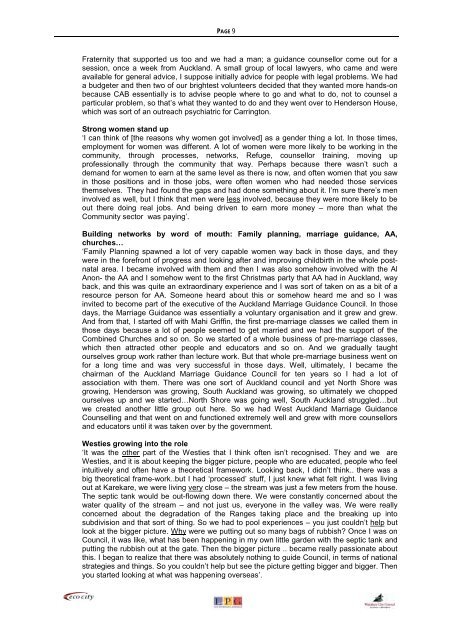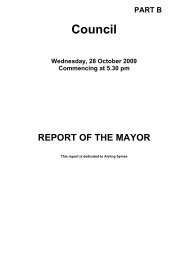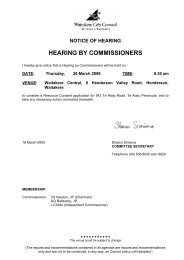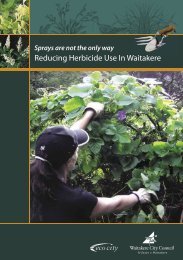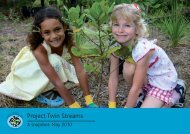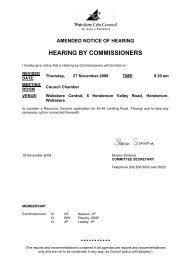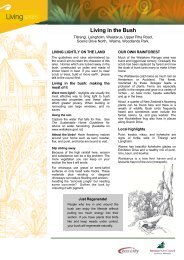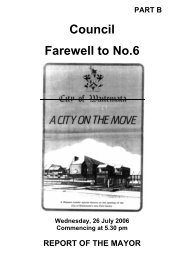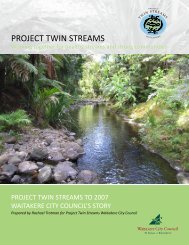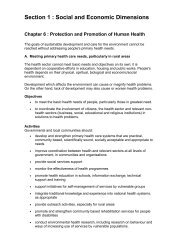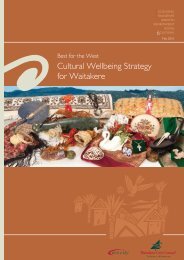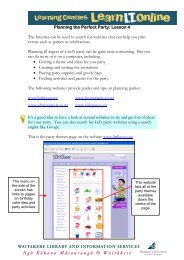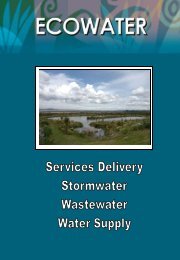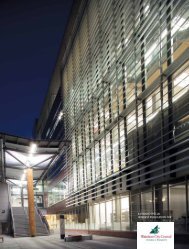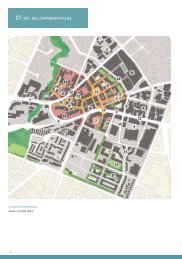The Waitakere Way - Looking Back, Going Forward - Auckland Council
The Waitakere Way - Looking Back, Going Forward - Auckland Council
The Waitakere Way - Looking Back, Going Forward - Auckland Council
You also want an ePaper? Increase the reach of your titles
YUMPU automatically turns print PDFs into web optimized ePapers that Google loves.
PAGE 9Fraternity that supported us too and we had a man; a guidance counsellor come out for asession, once a week from <strong>Auckland</strong>. A small group of local lawyers, who came and wereavailable for general advice, I suppose initially advice for people with legal problems. We hada budgeter and then two of our brightest volunteers decided that they wanted more hands-onbecause CAB essentially is to advise people where to go and what to do, not to counsel aparticular problem, so that’s what they wanted to do and they went over to Henderson House,which was sort of an outreach psychiatric for Carrington.Strong women stand up‘I can think of [the reasons why women got involved] as a gender thing a lot. In those times,employment for women was different. A lot of women were more likely to be working in thecommunity, through processes, networks, Refuge, counsellor training, moving upprofessionally through the community that way. Perhaps because there wasn’t such ademand for women to earn at the same level as there is now, and often women that you sawin those positions and in those jobs, were often women who had needed those servicesthemselves. <strong>The</strong>y had found the gaps and had done something about it. I’m sure there’s meninvolved as well, but I think that men were less involved, because they were more likely to beout there doing real jobs. And being driven to earn more money – more than what theCommunity sector was paying’.Building networks by word of mouth: Family planning, marriage guidance, AA,churches…‘Family Planning spawned a lot of very capable women way back in those days, and theywere in the forefront of progress and looking after and improving childbirth in the whole postnatalarea. I became involved with them and then I was also somehow involved with the AlAnon- the AA and I somehow went to the first Christmas party that AA had in <strong>Auckland</strong>, wayback, and this was quite an extraordinary experience and I was sort of taken on as a bit of aresource person for AA. Someone heard about this or somehow heard me and so I wasinvited to become part of the executive of the <strong>Auckland</strong> Marriage Guidance <strong>Council</strong>. In thosedays, the Marriage Guidance was essentially a voluntary organisation and it grew and grew.And from that, I started off with Mahi Griffin, the first pre-marriage classes we called them inthose days because a lot of people seemed to get married and we had the support of theCombined Churches and so on. So we started of a whole business of pre-marriage classes,which then attracted other people and educators and so on. And we gradually taughtourselves group work rather than lecture work. But that whole pre-marriage business went onfor a long time and was very successful in those days. Well, ultimately, I became thechairman of the <strong>Auckland</strong> Marriage Guidance <strong>Council</strong> for ten years so I had a lot ofassociation with them. <strong>The</strong>re was one sort of <strong>Auckland</strong> council and yet North Shore wasgrowing, Henderson was growing, South <strong>Auckland</strong> was growing, so ultimately we choppedourselves up and we started…North Shore was going well, South <strong>Auckland</strong> struggled…butwe created another little group out here. So we had West <strong>Auckland</strong> Marriage GuidanceCounselling and that went on and functioned extremely well and grew with more counsellorsand educators until it was taken over by the government.Westies growing into the role‘It was the other part of the Westies that I think often isn’t recognised. <strong>The</strong>y and we areWesties, and it is about keeping the bigger picture, people who are educated, people who feelintuitively and often have a theoretical framework. <strong>Looking</strong> back, I didn’t think.. there was abig theoretical frame-work..but I had ‘processed’ stuff, I just knew what felt right. I was livingout at Karekare, we were living very close – the stream was just a few meters from the house.<strong>The</strong> septic tank would be out-flowing down there. We were constantly concerned about thewater quality of the stream – and not just us, everyone in the valley was. We were reallyconcerned about the degradation of the Ranges taking place and the breaking up intosubdivision and that sort of thing. So we had to pool experiences – you just couldn’t help butlook at the bigger picture. Why were we putting out so many bags of rubbish? Once I was on<strong>Council</strong>, it was like, what has been happening in my own little garden with the septic tank andputting the rubbish out at the gate. <strong>The</strong>n the bigger picture .. became really passionate aboutthis. I began to realize that there was absolutely nothing to guide <strong>Council</strong>, in terms of nationalstrategies and things. So you couldn’t help but see the picture getting bigger and bigger. <strong>The</strong>nyou started looking at what was happening overseas’.


